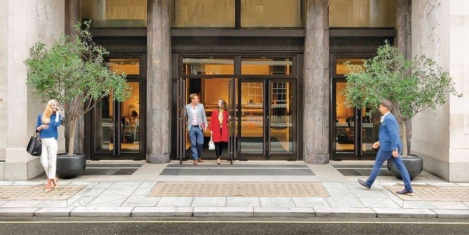October 20, 2017
One-fifth of UK jobs under threat from automation, but some regions more at risk than others
 Automation will affect one in five jobs across the UK, according to a new study from the thinktank Future Advocacy. According to the report, the risk of jobs being becoming automated is higher in some areas more than others and in the case of shadow chancellor John McDonnell’s west London constituency of Hayes and Harlington hits 40 percent, largely because it contains Heathrow Airport which employs a large number of people whose jobs are most at risk from automation. However, the report claims that a mere 2 percent of people surveyed were ‘very worried’ that they might be replaced by a machine, with a further 5 percent saying they were ‘fairly worried’.
Automation will affect one in five jobs across the UK, according to a new study from the thinktank Future Advocacy. According to the report, the risk of jobs being becoming automated is higher in some areas more than others and in the case of shadow chancellor John McDonnell’s west London constituency of Hayes and Harlington hits 40 percent, largely because it contains Heathrow Airport which employs a large number of people whose jobs are most at risk from automation. However, the report claims that a mere 2 percent of people surveyed were ‘very worried’ that they might be replaced by a machine, with a further 5 percent saying they were ‘fairly worried’.











 An overwhelming majority of employees are deliberately seeking out information they are not permitted to access, exposing a major cybersecurity problem among today’s workforce, claims new research published by One Identity. The survey, conducted by Dimensional Research, polled more than 900 IT security professionals on trends and challenges related to managing employee access to corporate data. Among key findings, a remarkable 92 percent of respondents report that employees at their organisations try to access information that is not necessary for their day-to-day work – with nearly one in four (23 percent) admitting this behaviour happens frequently. Most alarmingly, the report indicates that IT security professionals themselves are among the worst offenders of corporate data snooping. One in three respondents admit to having accessed sensitive information that is not necessary for their day-to-day work.
An overwhelming majority of employees are deliberately seeking out information they are not permitted to access, exposing a major cybersecurity problem among today’s workforce, claims new research published by One Identity. The survey, conducted by Dimensional Research, polled more than 900 IT security professionals on trends and challenges related to managing employee access to corporate data. Among key findings, a remarkable 92 percent of respondents report that employees at their organisations try to access information that is not necessary for their day-to-day work – with nearly one in four (23 percent) admitting this behaviour happens frequently. Most alarmingly, the report indicates that IT security professionals themselves are among the worst offenders of corporate data snooping. One in three respondents admit to having accessed sensitive information that is not necessary for their day-to-day work.


 Take up of new commercial offices in London’s West End in September 2017 hit the highest quarterly total on record – with tech and media firms, along with serviced office schemes being the most active, according to figures from real estate advisor Savills. The take-up was 857,259 sq ft (79,639 sq m) – bringing total take-up by the third quarter to 1.62 million sq ft (150,498 sq m). Leasing activity in the third quarter of 2017 brings total take-up year to date, to 3.99 million sq ft (370,671 sq m), which already surpasses 2016’s total annual take-up (3.97 million sq ft) and places the West End in a strong position to exceed the record 4.3 million sq ft (399,470 sq m) amassed in 2015. Key deals that helped elevate the market included: Aegis pre-letting the entire 310,000 sq ft (28,799 sq m) at British Land’s 1 Triton Square; The Boston Consulting Group pre-letting 123,500 sq ft (11,473 sq m) at 80 Charlotte Street and Spotify acquiring 104,133 sq ft (9,674 sq m) at The Adelphi.
Take up of new commercial offices in London’s West End in September 2017 hit the highest quarterly total on record – with tech and media firms, along with serviced office schemes being the most active, according to figures from real estate advisor Savills. The take-up was 857,259 sq ft (79,639 sq m) – bringing total take-up by the third quarter to 1.62 million sq ft (150,498 sq m). Leasing activity in the third quarter of 2017 brings total take-up year to date, to 3.99 million sq ft (370,671 sq m), which already surpasses 2016’s total annual take-up (3.97 million sq ft) and places the West End in a strong position to exceed the record 4.3 million sq ft (399,470 sq m) amassed in 2015. Key deals that helped elevate the market included: Aegis pre-letting the entire 310,000 sq ft (28,799 sq m) at British Land’s 1 Triton Square; The Boston Consulting Group pre-letting 123,500 sq ft (11,473 sq m) at 80 Charlotte Street and Spotify acquiring 104,133 sq ft (9,674 sq m) at The Adelphi.


 Half of employees feel their organisation doesn’t have the right tech skills and nearly half in a recent survey (44 percent) feel their organisation isn’t transforming into a digital led company fast enough, claims a survey by Sungard Availability Services. Digital workplace transformation has been a big talking point in recent months, yet 38 percent in a survey of over 2,000 IT decision makers and employees believe their organisation isn’t committed to digital transformation; with 36 percent not getting the training for the tools. It’s apparent that digital transformation is highly thought of in the work place and impacts employee retention with 36 percent of employees open to leaving their current job for a more digitally-progressive company. Over 50 percent believe career progression is better at digitally led companies and 69 percent say digital tools would help them to do their job better. Said Chris Ducker, Senior Director Global Proposition Strategy: “Digital is compulsory, not only to stay competitive in the market, but also to attract and retain key staff” See the full survey
Half of employees feel their organisation doesn’t have the right tech skills and nearly half in a recent survey (44 percent) feel their organisation isn’t transforming into a digital led company fast enough, claims a survey by Sungard Availability Services. Digital workplace transformation has been a big talking point in recent months, yet 38 percent in a survey of over 2,000 IT decision makers and employees believe their organisation isn’t committed to digital transformation; with 36 percent not getting the training for the tools. It’s apparent that digital transformation is highly thought of in the work place and impacts employee retention with 36 percent of employees open to leaving their current job for a more digitally-progressive company. Over 50 percent believe career progression is better at digitally led companies and 69 percent say digital tools would help them to do their job better. Said Chris Ducker, Senior Director Global Proposition Strategy: “Digital is compulsory, not only to stay competitive in the market, but also to attract and retain key staff” See the full survey 
















October 19, 2017
Future office and changing business of work debated at Workplace Trends
by Sara Bean • Comment, Coworking, Facilities management, Technology, Wellbeing, Workplace design
(more…)